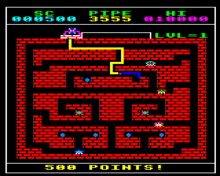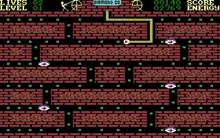Diamond Mine (video game)
| Diamond Mine | |
|---|---|
| Developer(s) | Mike Williams |
| Publisher(s) |
MRM Software Blue Ribbon |
| Platform(s) | Acorn Electron, Amstrad CPC, Atari 8-bit, BBC Micro, Commodore 16/Plus/4 |
| Release date(s) | 1984 |
| Genre(s) | Maze |
| Mode(s) | Single player |
| Diamond Mine II | |
|---|---|
| Developer(s) | Mike Williams |
| Publisher(s) | Blue Ribbon |
| Platform(s) | Acorn Electron, Amstrad CPC, BBC Micro, Commodore 16, Commodore Plus/4, MSX |
| Release date(s) | 1985 |
| Genre(s) | Maze |
| Mode(s) | Single player |
Diamond Mine is a video game first published by MRM Software for the Acorn Electron and BBC Micro home computers in 1984. It was reissued by Blue Ribbon in 1985 and ported to other systems in 1985 and 1986. Blue Ribbon also released a sequel Diamond Mine II at the same time. Both games are similar to the 1982 arcade game Anteater. While the maze design, limited pipe length and non-stop movement make the first game more original, Diamond Mine II could be considered an Anteater clone.
Gameplay


The aim of the game is to guide a pipe through a maze-like mine to collect diamonds while avoiding hitting the walls or the patrolling monsters. The player has a set length of pipe for each level. Once the pipe has started moving, it cannot stop and if it is retracted, that section of pipe is lost. If the pipe is hit by a monster or hits a wall, twice the amount of pipe is lost. Diamonds are placed sporadically in the maze and there is no way to kill the monsters.
The sequel is similar but with fundamental changes in the game play. The pipe can pause, can be retracted at any time without penalty and the walls cannot be hit. The monsters can be killed by touching them with the end of the pipe and they do not move while the pipe is being retracted. The maze is also populated by regular diamonds which more resemble the dots in a Pac-Man maze.
External links
- Diamond Mine at Atari Mania
- Diamond Mine at Plus/4 World
- Diamond Mine II at Plus/4 World
- Diamond Mine II at Generation MSX
- MRM Software at Acorn Electron World